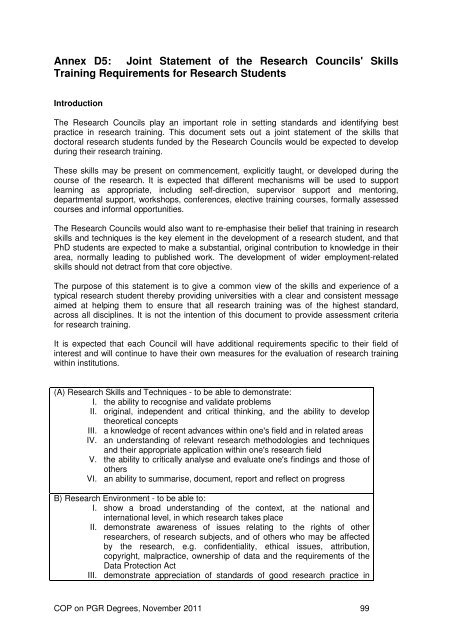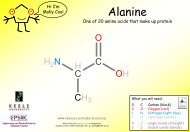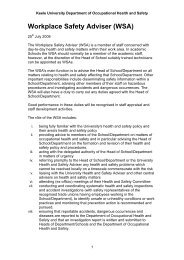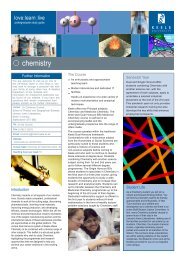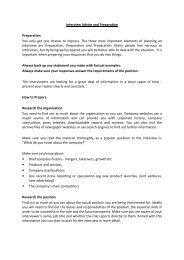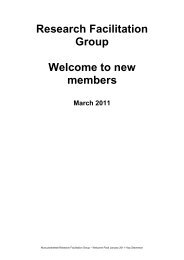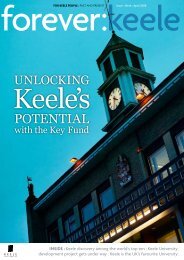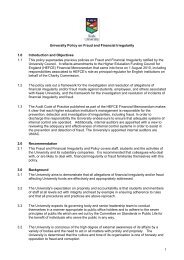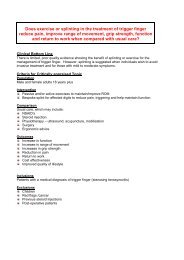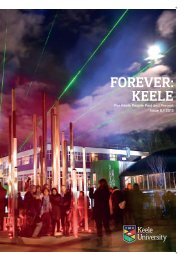keele university code of practice on postgraduate research degrees
keele university code of practice on postgraduate research degrees
keele university code of practice on postgraduate research degrees
You also want an ePaper? Increase the reach of your titles
YUMPU automatically turns print PDFs into web optimized ePapers that Google loves.
Annex D5: Joint Statement <str<strong>on</strong>g>of</str<strong>on</strong>g> the Research Councils' Skills<br />
Training Requirements for Research Students<br />
Introducti<strong>on</strong><br />
The Research Councils play an important role in setting standards and identifying best<br />
<str<strong>on</strong>g>practice</str<strong>on</strong>g> in <strong>research</strong> training. This document sets out a joint statement <str<strong>on</strong>g>of</str<strong>on</strong>g> the skills that<br />
doctoral <strong>research</strong> students funded by the Research Councils would be expected to develop<br />
during their <strong>research</strong> training.<br />
These skills may be present <strong>on</strong> commencement, explicitly taught, or developed during the<br />
course <str<strong>on</strong>g>of</str<strong>on</strong>g> the <strong>research</strong>. It is expected that different mechanisms will be used to support<br />
learning as appropriate, including self-directi<strong>on</strong>, supervisor support and mentoring,<br />
departmental support, workshops, c<strong>on</strong>ferences, elective training courses, formally assessed<br />
courses and informal opportunities.<br />
The Research Councils would also want to re-emphasise their belief that training in <strong>research</strong><br />
skills and techniques is the key element in the development <str<strong>on</strong>g>of</str<strong>on</strong>g> a <strong>research</strong> student, and that<br />
PhD students are expected to make a substantial, original c<strong>on</strong>tributi<strong>on</strong> to knowledge in their<br />
area, normally leading to published work. The development <str<strong>on</strong>g>of</str<strong>on</strong>g> wider employment-related<br />
skills should not detract from that core objective.<br />
The purpose <str<strong>on</strong>g>of</str<strong>on</strong>g> this statement is to give a comm<strong>on</strong> view <str<strong>on</strong>g>of</str<strong>on</strong>g> the skills and experience <str<strong>on</strong>g>of</str<strong>on</strong>g> a<br />
typical <strong>research</strong> student thereby providing universities with a clear and c<strong>on</strong>sistent message<br />
aimed at helping them to ensure that all <strong>research</strong> training was <str<strong>on</strong>g>of</str<strong>on</strong>g> the highest standard,<br />
across all disciplines. It is not the intenti<strong>on</strong> <str<strong>on</strong>g>of</str<strong>on</strong>g> this document to provide assessment criteria<br />
for <strong>research</strong> training.<br />
It is expected that each Council will have additi<strong>on</strong>al requirements specific to their field <str<strong>on</strong>g>of</str<strong>on</strong>g><br />
interest and will c<strong>on</strong>tinue to have their own measures for the evaluati<strong>on</strong> <str<strong>on</strong>g>of</str<strong>on</strong>g> <strong>research</strong> training<br />
within instituti<strong>on</strong>s.<br />
(A) Research Skills and Techniques - to be able to dem<strong>on</strong>strate:<br />
I. the ability to recognise and validate problems<br />
II. original, independent and critical thinking, and the ability to develop<br />
theoretical c<strong>on</strong>cepts<br />
III. a knowledge <str<strong>on</strong>g>of</str<strong>on</strong>g> recent advances within <strong>on</strong>e's field and in related areas<br />
IV. an understanding <str<strong>on</strong>g>of</str<strong>on</strong>g> relevant <strong>research</strong> methodologies and techniques<br />
and their appropriate applicati<strong>on</strong> within <strong>on</strong>e's <strong>research</strong> field<br />
V. the ability to critically analyse and evaluate <strong>on</strong>e's findings and those <str<strong>on</strong>g>of</str<strong>on</strong>g><br />
others<br />
VI. an ability to summarise, document, report and reflect <strong>on</strong> progress<br />
B) Research Envir<strong>on</strong>ment - to be able to:<br />
I. show a broad understanding <str<strong>on</strong>g>of</str<strong>on</strong>g> the c<strong>on</strong>text, at the nati<strong>on</strong>al and<br />
internati<strong>on</strong>al level, in which <strong>research</strong> takes place<br />
II. dem<strong>on</strong>strate awareness <str<strong>on</strong>g>of</str<strong>on</strong>g> issues relating to the rights <str<strong>on</strong>g>of</str<strong>on</strong>g> other<br />
<strong>research</strong>ers, <str<strong>on</strong>g>of</str<strong>on</strong>g> <strong>research</strong> subjects, and <str<strong>on</strong>g>of</str<strong>on</strong>g> others who may be affected<br />
by the <strong>research</strong>, e.g. c<strong>on</strong>fidentiality, ethical issues, attributi<strong>on</strong>,<br />
copyright, mal<str<strong>on</strong>g>practice</str<strong>on</strong>g>, ownership <str<strong>on</strong>g>of</str<strong>on</strong>g> data and the requirements <str<strong>on</strong>g>of</str<strong>on</strong>g> the<br />
Data Protecti<strong>on</strong> Act<br />
III. dem<strong>on</strong>strate appreciati<strong>on</strong> <str<strong>on</strong>g>of</str<strong>on</strong>g> standards <str<strong>on</strong>g>of</str<strong>on</strong>g> good <strong>research</strong> <str<strong>on</strong>g>practice</str<strong>on</strong>g> in<br />
COP <strong>on</strong> PGR Degrees, November 2011 99


